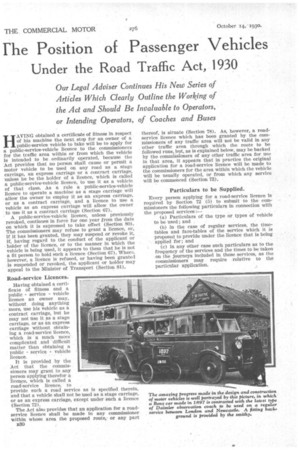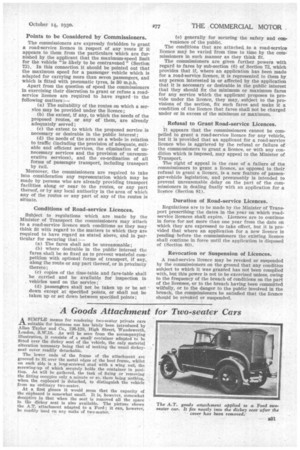rhe Position of Passenger Vehicles
Page 56

Page 57

If you've noticed an error in this article please click here to report it so we can fix it.
Under the Road Traffic Act, 1930
Our Legal Adviser Continues His New Series of Articles Which Clearly Outline the Working of the Act and Should Be Invaluable to Operators, or Intending Operators, of Coaches and Buses
HAVING obtained a certificate of fitness in respect of his machine the next step for an owner of a public-service vehicle to take will be to apply for a public-service-vehicle licence to the commissioners for the traffic area within or from which the vehicle Is intended to be ordinarily operated, because the Act provides that no person shall cause or permit a motor vehicle to be used on any road as a stage carriage, an express carriage or a contract carriage, unless he be the holder of a licence, which is called a public-service-vehicle licence, to use it as a vehicle of that class. As a rule a public-service-vehicle licence to operate a machine as a stage carriage will allow the owner to employ it as an express carriage, or as a contract carriage, and a licence to use a vehicle as an express carriage will allow the owner to use it as a contract carriage (Section 67).
• A public-service-vehicle licence, unless previously revoked, continues in force for one year from the date on which it is expressed to take effect (Section 80). The commissioners may refuse to grant a licence, or, if it has been granted, they may suspend or revoke it, if, having regard to the conduct of the applicant or holder of the licence, or to the manner in which the vehicle is being used, it appears to them that he is not a fit person to hold such a licence (Section 67). Where. however, a licence is refused, or having been granted is suspended or revoked, the applicant or holder may appeal to the Minister of Transport (Section 81).
Road-service Licences.
Having obtained a certificate of fitness and a public service vehicle licence an owner may, without doing anything more, use his vehicle as a contract carriage, but he may not use it as a stage carriage, or as an express carriage without obtaining a road-service licence,. which is a much more complicated and difficult matter than obtaining a public service vehicle licence. '
It is provided by the Act that the commissioners may grant to any person applying therefor a licence, which is called a road-service licence, to provide such a road service as is specified therein, and that a vehicle shall not be used as a stage carriage, or as an express carriage, except under such a licence (Section 72).
The Act also provides that an application for a roadservice licence shall be made to any commissioner within whose area the proposed route,or any part B30 thereof, is situate (Section 78). As, however, a roadservice licence which has been granted by the commissioners of any traffic area will not be valid in any other traffic area through which the route to be followed runs, but, as is explained below, may be backed by the commissioners of any other traffic area for use in that area, it appears that in practice the original application for a road-service licence will be made to the commissioners for the area within which the vehicle will be usually operated, or from which any service will be commenced (Section 73).
Particulars to be Supplied.
Every person applying for a road-service licence is required by Section 72 (5) to submit to the commissioners the following particulars in connection with the proposed services :— (a) Particulars of the type or types of vehicle to be used; and (b) in the case of regular services, the timetables and fare-tables of the service which it is proposed to provide under the licence that is being applied for ; and (c) in any other case such particulars as to the frequency of the services and the times to be taken on the journeys included in those services, as the commissioners may require relative to the particular application.
The commissioners are expressly forbidden to grant a road-service licence in respect of any 'route if it appears to them from the particulars which are furnished by the applicant that the maximum-speed limit for the vehicle "is likely to be contravened" (Section 72). In this connection it should be pointed out that the maximum speed for a passenger vehicle which is adapted for carrying more than seven passengers, and which is fitted with pneumatic tyres, is 30 m.p.h.
Apart from the question of speed the commissioners in exercising their discretion to grant or refuse a roadservice licence are required to have regard to the following matters :— (a) The suitability of the routes on which a service may be provided under the licence; (b) the extent, if any, to which the needs of the proposed routes, or any of them, are already adequately served; (c) the extent to which the proposed service is necessary or desirable in the public interest; (d) the needs of the area as a whole in relation to traffic (including the provision of adequate, suitable and efficient services, the elimination of unnecessary services and the provision of unremunerative services), and the co-ordination of all forms of passenger transport, including transport by rail.
Moreover, the commissioners are required to take Into consideration any representation which may be made by persons who are already providing transport facilities along or near to the routes, or any part thereof, or by any local authority in the area of which any of the routes or any part of any of the routes is situate.
Conditions of Road-service Licences.
Subject to regulations which are made by the Minister of Transport the commissioners may attach to a road-service licence such conditions as they may think fit with regard to the matters to which they are required to have regard as stated above, and in particular for securing that :— (a) The fares shall not be unreasonable ; (b) where desirable in the public interest the fares shall be so fixed as to prevent wasteful competition with optional forms of transport, if any, along the route or any part thereof, or in proximity thereto; (c) copies of the time-table and fare-table shall be carried and be available for inspection in vehicles used on the service: (d) passengers shall not be taken up or be set down except at specified points, or shall not be taken up or set down between specified points ;
(e) generally for securing the safety and convenience of the public.
The conditions that are attached to a road-service licence may be varied from time to time, by the commissioners in such manner as they think fit.
The commissioners are given further powers with regard to fares by sub-section (6) of Section 72, which provides that if, where an application has been made for a road-service licence, it is represented to them by any person interested in or affected by the application that it is necessary or desirable• in the public interest that they should fix the minimum or maximum fares for any service which the applicant proposes to provide under the licence, they may, subject to the provisions of the section, fix such fares and make it a condition of the licence that fares shall not be charged tinder or in excess of the minimum or maximum.
Refusal to Grant Road-service Licences.
It appears that the commissioners cannot be compelled to grant a road-service licence for any vehicle, but it is provided that an applicant for a road-service licence who is aggrieved by the refusal or failure of the commissioners to grant a licence, or with any condition which is imposed, may appeal to the Minister of Transport.
The right of appeal in the case of a failure of the commissioners to grant a licence, as opposed to their refusal to grant a licence, is a new feature of passenger-vehicle legislation, and presumably is intended to prevent unreasonable delay on the part of the commissioners in dealing finally with an application for a licence (Section 81).
Duration of Road-service Licences.
Regulations are to be made by the Minister of Transport prescribing the dates in the year on which roadservice licences shall expire. Licences are to continue in force for not more than one year from the date on which they are expressed to take effect, but it is provided that where an application for a new licence is pending before the commissioners the existing licence shall continue in force until the application is disposed of (Section 80).
Revocation or Suspension of Licences.
A road-service licence may be revoked or suspended by the commissioners on the ground that any condition subject to which it was granted has not been complied with, but this power is not to be exercised unless, owing to the frequency of the breach of conditions on the part of the licensee, or to the breach having been committed wilfully, or to the danger to the public involved in the breach, the commissioners be satisfied that the licence should be revoked or suspended.




















































































































